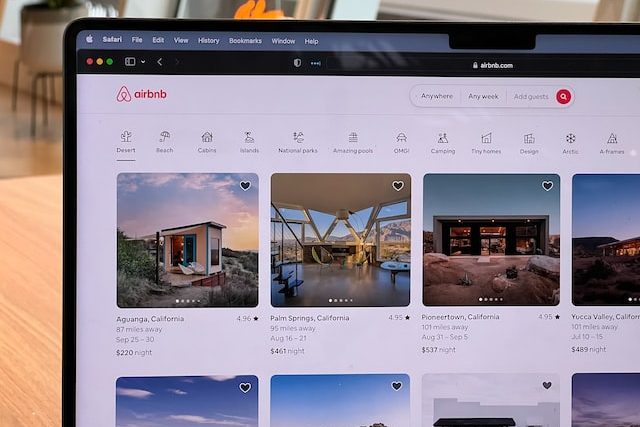Before we get into the specifics of Airbnb, let’s understand competitor analysis. Competitor analysis is a strategic research method companies use to identify, evaluate, and understand their current and potential competitors within the market. It’s an essential business strategy component and instrumental in understanding the industry landscape.
The process usually involves the following steps:
- Identifying Key Competitors: The first step is to identify who your competitors are. These may be direct competitors (those who offer the same or similar products or services as you) or indirect competitors (those who provide different products or services but compete for the same consumer dollar).
- Analyzing Competitors’ Strategies and Objectives: Once competitors are identified, the next step is to understand their business strategies and objectives. This may involve analyzing their marketing materials, financial performance, customer reviews, or any public information available about the company.
- Assessing Competitors’ Strengths and Weaknesses: This step involves evaluating the identified competitors’ strengths and weaknesses. Strengths include unique products or services, strong brand recognition, and superior customer service. Weaknesses include poor product quality, weak customer service, or high prices.
- Understanding Competitors’ Products/Services: Understanding what your competitors offer and how your products or services compare is important. This could involve looking at features, quality, pricing, customer service, and marketing strategies.
- Observing Competitors’ Reaction Patterns: Some companies react more aggressively than others when faced with competition. Understanding these patterns lets you predict how these companies might respond to your business strategies.
- Drawing Conclusions and Formulating Strategy: The final step is to take all the information gathered from the analysis, draw meaningful conclusions, and use those to formulate or adjust your business strategies.
The main goal of a competitor analysis is to understand the competitive landscape, spot opportunities and threats, and position your company most advantageously. It helps to inform strategic decisions, from product development to marketing and sales efforts. Now, let’s do a competitor analysis of Airbnb.
Here is the competitor analysis of Airbnb
Airbnb is a popular online marketplace for lodging, primarily homestays for vacation rentals and tourism activities. It faces competition from various companies and platforms in the hospitality industry. Some notable competitors of Airbnb include:
Booking.com
- Target Market and Offerings:
- Airbnb: Primarily targets travelers looking for unique, local experiences. Airbnb’s diverse offerings include private rooms in shared homes, entire homes, apartments, and unique accommodations like treehouses and yurts. Airbnb also offers Airbnb Experiences, which are activities hosted by locals.
- Booking.com: Traditionally focused on hotel bookings, it has a broader offering, including hotels, motels, and unique stays. Booking.com attracts travelers looking for more traditional lodging options.
- Brand Identity and Marketing:
- Airbnb: Emphasizes a sense of community and local experience. Its marketing campaigns often focus on living like a local and experiencing destinations as residents do.
- Booking.com: Focuses on a wide range of choices and the convenience of booking various types of accommodations. Its marketing often emphasizes the ease of use and a wide selection of traditional lodging options.
- Pricing and Fees:
- Airbnb: Has a pricing model that includes service fees for guests and hosts. Prices can vary greatly depending on the location, type of accommodation, and added experiences.
- Booking.com: Generally operates on a commission model from the property owners. For guests, the pricing is often perceived as more straightforward without additional service fees.
- User Experience and Interface:
- Airbnb: Known for its user-friendly interface that emphasizes high-quality photos and detailed descriptions of unique stays. It also provides a platform for hosts and guests to communicate directly.
- Booking.com: Offers a comprehensive search and booking interface with robust filtering options, particularly effective for comparing traditional accommodation types like hotels.
- Global Presence and Inventory:
- Airbnb: Has a strong presence in many countries, with a wide range of unique property listings that appeal to various segments of travelers.
- Booking.com: Known for its extensive global reach, particularly strong in Europe, it offers a vast inventory of hotels and other traditional lodging options.
- Loyalty Programs and Perks:
- Airbnb: It does not have a traditional loyalty program, but it focuses on creating memorable experiences that encourage repeat bookings.
- Booking.com: Offers a loyalty program called “Genius,” providing perks like discounts and freebies, which appeals to frequent travelers.
Expedia
- Business Focus and Inventory:
- Airbnb: Specializes in offering unique and local lodging experiences, including private rooms, entire homes, and unconventional options like treehouses, boats, and cabins. Airbnb also offers “Experiences,” which are activities hosted by locals to provide a more immersive travel experience.
- Expedia: Primarily a travel booking platform for hotels, flights, car rentals, and vacation packages. While it also offers vacation rentals, it focuses more on traditional travel services.
- Target Audience:
- Airbnb: Appeals to travelers seeking unique, local, or authentic experiences. This includes leisure and business travelers looking for a homely feel or a distinctive stay.
- Expedia: Attracts a broad range of travelers, often those looking for convenience in booking entire travel itineraries, including hotels, flights, and cars, in one place.
- Brand Identity and Marketing:
- Airbnb: Markets itself as a platform for living like a local. It emphasizes experiences, community, and the uniqueness of its listings.
- Expedia: Focuses on being a one-stop shop for all travel needs. Its marketing strategies often center on convenience, variety, and comprehensive travel solutions.
- Pricing and Fee Structure:
- Airbnb: Known for its varied pricing, with costs set by individual hosts. It also charges service fees to both guests and hosts.
- Expedia: Operates primarily on a commission model from partners (hotels, airlines, etc.) and is known for offering package deals and sometimes more competitive pricing in traditional lodging.
- User Experience and Technology:
- Airbnb: Offers a user-friendly platform with a strong emphasis on visuals, detailed descriptions, and a personal touch in its listings. The platform facilitates direct communication between hosts and guests.
- Expedia: Provides a robust, comprehensive booking platform with extensive filtering options, particularly effective for comparing prices and features across traditional accommodation types, flights, and car rentals.
- Global Reach and Local Presence:
- Airbnb: Has a significant global footprint with a diverse range of properties, including in areas that may not have many traditional hotels.
- Expedia: It also has a global presence but is particularly strong in regions with a high density of conventional hotels and tourist destinations.
- Loyalty Programs and Customer Incentives:
- Airbnb: Lacks a conventional loyalty program but relies on its unique offerings and community-driven approach to foster customer loyalty.
- Expedia: Expedia Rewards offers a loyalty program that allows customers to earn points and receive benefits across a wide range of travel services.
TripAdvisor Rentals
- Market Focus and Inventory:
- Airbnb: Offers a wide variety of unique and local accommodations, including private rooms, entire homes, apartments, and special stays like treehouses or castles. Airbnb also features “Experiences,” which are activities hosted by locals, adding to the travel experience.
- TripAdvisor Rentals: As a segment of TripAdvisor, it offers vacation rentals that are often integrated with their travel reviews and recommendations. Its inventory includes homes, apartments, and villas, significantly focusing on traveler reviews.
- Brand Identity and User Experience:
- Airbnb: Markets itself as a community-driven platform focusing on unique, authentic experiences. Its website and app emphasize high-quality visuals and detailed descriptions of each listing, with a user-friendly interface.
- TripAdvisor Rentals: Leverages the strength of the TripAdvisor brand, known for its extensive user reviews and travel advice. The platform is integrated with these reviews, offering a comprehensive view of accommodations and local attractions.
- Target Audience:
- Airbnb: Appeals to a diverse range of travelers, from budget solo travelers to luxury seekers, emphasizing unique local experiences.
- TripAdvisor Rentals: Target travelers already using TripAdvisor for travel planning and are keen on making informed decisions based on reviews and ratings.
- Pricing and Fees:
- Airbnb: Airbnb’s pricing is set by the hosts and can vary widely. It also includes service fees for both guests and hosts.
- TripAdvisor Rentals: The pricing is also set by property owners. TripAdvisor Rentals might charge a booking fee, and its pricing model can vary based on the property.
- Community and Reviews:
- Airbnb: Strongly emphasizes building a community. Reviews on Airbnb are critical, but they are more focused on the individual properties and the host-guest relationship.
- TripAdvisor Rentals: Benefits from TripAdvisor’s vast user base and its culture of reviews. Reviews are not just limited to the properties but also encompass local attractions and activities, offering a broader context for travelers.
- Global Reach:
- Airbnb: Has a substantial global presence, with listings in many countries and cities worldwide, including places where traditional hotels might not be as prevalent.
- TripAdvisor Rentals: It also has a broad global reach, benefiting from TripAdvisor’s extensive user base and popularity among travelers worldwide.
- Search and Discovery:
- Airbnb: Airbnb is known for its intuitive search and discovery process, with features like Airbnb Experiences that help travelers discover activities and local experiences.
- TripAdvisor Rentals: Integrates rental search with travel planning, allowing users to find accommodations in conjunction with attractions, restaurants, and other travel activities.
Hostelworld
- Target Market and Accommodation Types:
- Airbnb: Primarily targets travelers looking for unique accommodations, ranging from private rooms in homes to entire houses, apartments, and unique stays like treehouses. Airbnb appeals to many travelers seeking luxury, comfort, or local experiences.
- Hostelworld: Specifically targets budget travelers, mainly backpackers and solo travelers, offering a selection of hostels worldwide. Hostelworld often focuses on affordable, social accommodations with shared rooms and common areas.
- User Experience and Community:
- Airbnb: Emphasizes a sense of community and belonging with a platform that facilitates interaction between hosts and guests. Airbnb’s interface is geared towards showcasing individual properties and experiences, highlighting the uniqueness of each listing.
- Hostelworld: Focuses on the social aspect of travel, highlighting hostels known for their communal environments. The platform caters to those looking for social interactions, group activities, and a communal atmosphere.
- Brand Identity and Marketing:
- Airbnb: Markets itself as a way to experience destinations like a local, offering a wide variety of experiences and accommodations. Airbnb’s marketing often emphasizes the uniqueness of its offerings and the opportunity to live anywhere.
- Hostelworld: Positions itself as the go-to platform for budget and social travel, often emphasizing hostel stays’ adventure and communal aspects. Marketing campaigns typically focus on the affordability and social nature of hostels.
- Pricing and Fees:
- Airbnb: Offers a range of prices set by hosts and includes service fees for guests and hosts. Pricing can vary greatly depending on the type of accommodation and location.
- Hostelworld: Known for its budget-friendly options, primarily focusing on low-cost shared accommodations. The platform usually charges guests a booking fee.
- Global Reach:
- Airbnb: Has a significant global footprint with listings in numerous countries, offering diverse accommodation types in various locations, including areas without many hostels or hotels.
- Hostelworld: Also has a broad global reach but is concentrated explicitly in areas popular with backpackers and budget travelers.
- Additional Services and Features:
- Airbnb: Beyond accommodations, Airbnb offers “Experiences” – activities led by local hosts. This diversification allows travelers to immerse themselves in local cultures and activities.
- Hostelworld: While mainly focused on hostel bookings, Hostelworld also provides resources and information tailored to budget and solo travelers, such as travel tips and guides.
Vrbo (Vacation Rentals by Owner)
- Target Market and Inventory:
- Airbnb: Offers a wide range of accommodations, including private rooms, entire homes, apartments, and unique stays (like treehouses, igloos, etc.). Airbnb targets a broad spectrum of travelers, from budget solo travelers to those seeking luxury experiences and business travelers.
- Vrbo: Primarily focuses on whole property rentals, such as entire homes, condos, and villas. Vrbo caters more to groups traveling together, like families and friends, who prefer private, entire-place bookings.
- User Experience and Brand Identity:
- Airbnb: Known for its user-friendly platform focusing on unique, local experiences. Airbnb’s brand is built around “living like a local” and the community aspect of sharing homes.
- Vrbo: Emphasizes a more traditional vacation rental experience, focusing on the privacy and amenities of renting entire properties. Vrbo’s interface facilitates the search for more extensive, family-friendly accommodations.
- Market Positioning and Marketing:
- Airbnb: Markets itself as a platform for unique and authentic experiences. It’s not just about the stay but also the experience of the destination. Airbnb’s marketing campaigns often focus on the diversity and uniqueness of its listings.
- Vrbo: Positions itself as a provider of family and group vacation homes. Its marketing efforts often center on creating memorable group or family vacations in comfortable and private accommodations.
- Pricing and Fee Structure:
- Airbnb: Implements a pricing model, including service fees for guests and hosts. The pricing set by hosts can vary widely based on the type of accommodation and location.
- Vrbo: Typically charges a service fee to guests. Hosts may pay a subscription fee or a per-booking fee. Vrbo’s pricing tends to focus on whole-property rentals, which can be higher in price but offer more space and amenities.
- Global Presence and Reach:
- Airbnb: Has a substantial global footprint, with listings in many countries and cities worldwide, including urban, rural, and remote locations.
- Vrbo: Also has a significant global presence, but it is solid in specific markets, especially in the United States.
- Additional Services and Features:
- Airbnb: Beyond accommodations, Airbnb offers “Experiences” – activities and adventures led by local hosts. These range from cooking classes to outdoor activities, adding an experiential aspect to tra
- Vrbo: Focuses primarily on accommodations. While it doesn’t offer additional experiences like Airbnb, it often highlights properties with specific amenities suitable for families or groups (e.g., pools and large kitchens).









